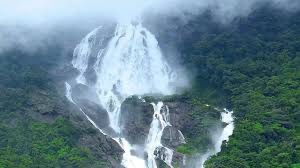Mhadei River Diversion Sparks Concerns for Dudhsagar Falls and Goa’s Ecosystem
The Mhadei River, a vital lifeline for Goa’s ecosystems and communities, is at the heart of a growing controversy as Karnataka’s plans to divert its waters threaten the iconic Dudhsagar Falls and the region’s rich biodiversity. The recently released draft of the Goa State Biodiversity Strategy and Action Plan (GSBSAP) has sounded the alarm, warning that the proposed diversion could disrupt the delicate balance of flora, fauna, and ecotourism in one of India’s most cherished natural landscapes. This issue, steeped in decades of interstate water disputes, underscores the tension between development and environmental preservation.
Originating in the Western Ghats, the Mhadei River—known as the Mandovi River in Goa—flows through lush forests before cascading as the majestic Dudhsagar Falls, a four-tiered waterfall that attracts thousands of tourists annually. According to the GSBSAP, Karnataka’s plan to divert water from tributaries like Katla and Palna to the Supa reservoir in the Kali basin could drastically reduce water flow to the falls. Experts cited in the report warn that this reduction would not only diminish the waterfall’s aesthetic grandeur but also jeopardize the ecosystems that depend on it. The falls and surrounding Bhagwan Mahavir Wildlife Sanctuary in Mollem are home to diverse species, including endemic birds like the flame-throated bulbul and fish such as the barramundi. Reduced water availability could intensify competition for resources, leading to population declines among these species.
The GSBSAP emphasizes that the diversion poses a broader threat to ecotourism, a significant economic driver for Goa. Dudhsagar Falls is not just a natural wonder but a cultural and economic asset, drawing visitors who sustain local businesses. A diminished waterfall could deter tourists, impacting livelihoods in the region. The report calls for urgent research to better understand the ecological ramifications and recommends measures like constructing check dams to mitigate impacts, though such solutions remain contentious.
The Mhadei water dispute has long been a flashpoint between Goa, Karnataka, and Maharashtra, with the Mhadei Water Disputes Tribunal (MWDT) established in 2010 to mediate. In 2018, the tribunal permitted Karnataka to divert 13.42 tmcft of water, including 1.72 tmcft from the Kalasa tributary and 2.18 tmcft from the Bhandura tributary. However, recent studies, including one by hydrologists from the National Institute of Oceanography (NIO), suggest that while these diversions may have a limited impact on the Mandovi estuary, the northern part of the Mhadei Wildlife Sanctuary could face significant ecological stress. Goa has challenged the tribunal’s decision in the Supreme Court, arguing that the diversions threaten water security for its central regions, including the capital, Panaji.
Public sentiment in Goa reflects deep concern. Posts on social media platforms describe Dudhsagar as “Goa’s heritage” and rally against the diversion, with hashtags like #SaveDudhsagar gaining traction. Local activists, including members of the Mhadei Movement, have protested reports that downplay the diversion’s impact, accusing researchers of overlooking ground realities. Environmentalists argue that the Western Ghats, a UNESCO World Biodiversity Hotspot, face cumulative threats from water-intensive agriculture and deforestation, exacerbating the region’s vulnerability to climate change.
The GSBSAP’s recommendations offer a path forward, urging biodiversity conservation through collaborative governance. The Goa State Biodiversity Board has encouraged local Biodiversity Management Committees to pass resolutions opposing the diversion, reflecting grassroots resistance. Experts advocate for sustainable water management practices and stricter oversight of development projects to protect the Mhadei’s flow. The report also highlights the need for comprehensive studies to catalog the full extent of species reliant on the river, as current data remains incomplete.
As the dispute unfolds, the fate of Dudhsagar Falls hangs in the balance. The Mhadei River is more than a waterway; it is a lifeline that sustains Goa’s natural and cultural heritage. Balancing the water needs of neighboring states with the preservation of this fragile ecosystem requires nuanced dialogue and evidence-based policies. For now, Goa’s fight to protect its iconic waterfall underscores a broader call to prioritize biodiversity and sustainability in the face of competing developmental pressures.


